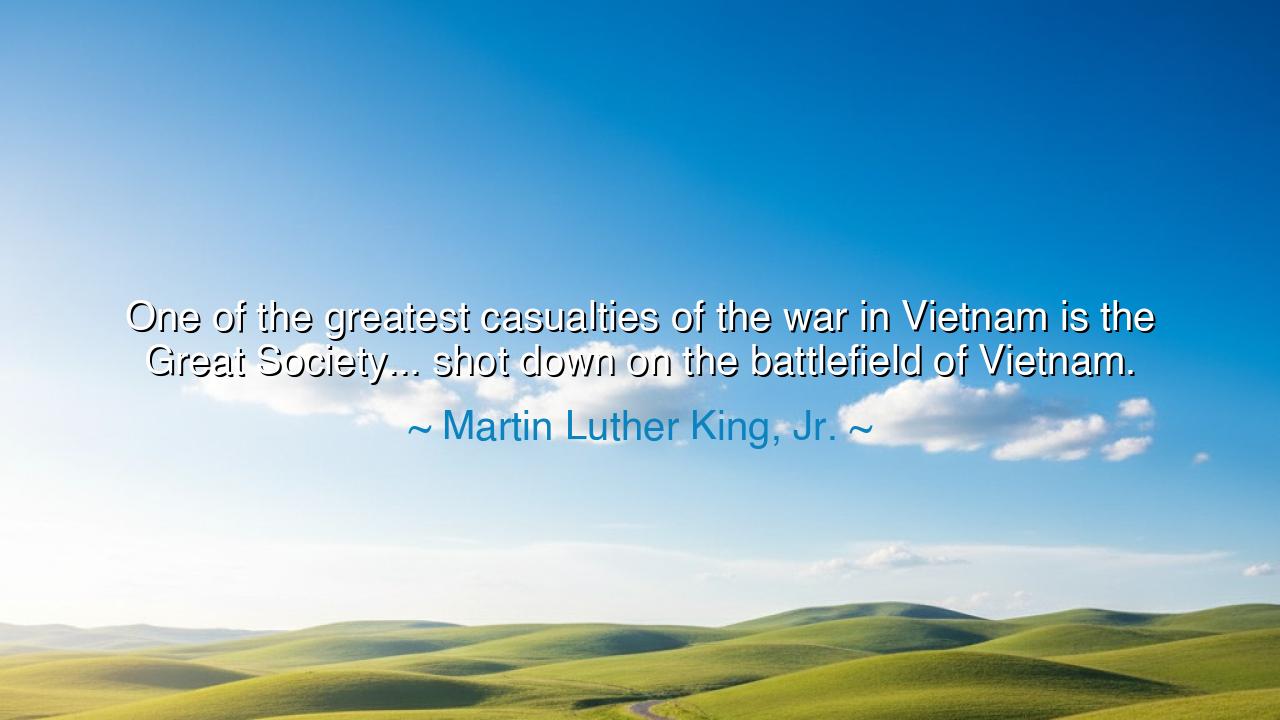
One of the greatest casualties of the war in Vietnam is the Great
One of the greatest casualties of the war in Vietnam is the Great Society... shot down on the battlefield of Vietnam.






“One of the greatest casualties of the war in Vietnam is the Great Society... shot down on the battlefield of Vietnam.” Thus spoke Martin Luther King, Jr., the prophet of peace and justice, whose voice thundered not only against racial oppression, but against the deeper sickness of violence that threatened the soul of a nation. In these words, he mourned not only the loss of lives in a foreign land, but the death of hope at home — the silencing of a vision that sought to lift the poor, to heal the broken, and to unite the divided. His lament was not merely political; it was moral, spiritual, and profoundly human.
The Great Society was the dream of President Lyndon B. Johnson, born in the 1960s — a vision of America transformed by justice, education, and opportunity. It sought to end poverty, to expand civil rights, and to build a nation where every citizen could share in prosperity. New schools were built, voting rights secured, health programs established, and hunger challenged. It was, for a moment, the flowering of compassion within a country long scarred by inequality. Yet even as this dream took root, a shadow rose on the horizon — the war in Vietnam. The nation that promised abundance turned its wealth to weapons; the energy of reform was consumed by the engines of destruction. King saw this clearly and cried out that America was killing its conscience abroad while starving its spirit at home.
For Dr. King, the tragedy was not only in the blood spilled on the battlefields of Asia, but in the betrayal of a moral awakening. The same government that spoke of justice for the poor now sent the poor to die in distant jungles. He saw young Black men sent to fight for freedoms abroad that they were denied in their own country; he saw the resources that could have built schools, hospitals, and homes being poured instead into bombs and bullets. Thus he declared that the Great Society had been “shot down” — not by the enemy’s gun, but by America’s own hand. The war had become a thief of both treasure and vision, robbing the nation of its higher purpose.
In his sermon Beyond Vietnam, delivered at Riverside Church in 1967, King risked the wrath of allies and the condemnation of power to speak this truth. Many urged him to stay silent, to confine his message to civil rights. But King could not separate peace from justice, nor liberty from love. He said, “A nation that continues year after year to spend more money on military defense than on programs of social uplift is approaching spiritual death.” His words struck like lightning, illuminating the moral contradiction of his age — that a people cannot build greatness on violence, nor peace on the ruins of compassion.
History soon proved him right. As the war deepened, poverty programs were cut, trust in government withered, and division tore the nation apart. The Great Society, once a symbol of renewal, faded into memory as America’s heart hardened under the strain of conflict. Yet King’s vision endured, for it was rooted not in policy, but in eternal truth: that a nation’s greatness is measured not by its power to destroy, but by its power to uplift. Like the prophets of old, he warned that injustice abroad breeds injustice at home, and that violence, once unleashed, devours both the oppressor and the oppressed.
The lesson of King’s words reaches beyond his time. Even now, societies across the earth face the same choice he described: between war and welfare, between ego and empathy, between fear and compassion. Each generation must decide whether it will build bridges or burn them, whether it will spend its strength on conquest or on care. The true battlefield, he reminds us, is not in distant lands, but in the human heart — the struggle between the lust for domination and the longing for peace.
Therefore, O seeker of truth, take heed of this teaching. Let your voice and your labor serve not the gods of war, but the spirit of justice and mercy. Do not allow the pursuit of power to silence the call of conscience. If you would build a great society, begin by building compassion in your own heart — for all nations are only mirrors of their people’s souls. To “act big,” as Roosevelt once said, is not to conquer, but to care greatly.
So remember King’s lament, and turn it into a vow: let no vision of goodness die upon the battlefield of greed or indifference. The Great Society — and every noble dream — can live again wherever men and women choose cooperation over conflict, creation over destruction, and love over fear. For in the end, it is not wars that make nations great, but the courage to choose peace when war seems easy.






AAdministratorAdministrator
Welcome, honored guests. Please leave a comment, we will respond soon